Magnetic wire pullers are a game-changer in the world of electrical installations. Have you ever struggled with routing wires through tight spaces?
These innovative tools simplify the task, using a powerful magnet to guide wires through walls, ceilings, and confined areas.
We’ve explored various models to determine which magnetic wire pullers truly stand out. In this article, we share our top three picks:
| Klein Tools | Magnepull | Chromex | |
|---|---|---|---|
| Magnet Strength | Strong Rare-Earth magnets | 30% more pulling strength than others | Moderate magnet strength |
| Design | Mar-resistant wheels, pivot handle | Patented locking clutch system | 25-foot nylon string with spool |
| Ease of Use | Easy control and maneuverability | Requires only a 3/4 inch hole | Long string allows easy navigation |
| Storage | Hard plastic carrying case | Professional-grade hard case | Semi-hard case with zipper |
| Additional Functionality | Doubles as a metal stud finder | Rugged design for professionals | Detachable brass eyelet leader |
| Price Range | Mid-range | Higher cost, professional-grade | Affordable, entry-level tool |
| Ideal Use | General wire pulling tasks | Heavy-duty, professional use | Basic wire pulling, flexible use |
1. Klein Tools 50611 Magnetic Wire Puller
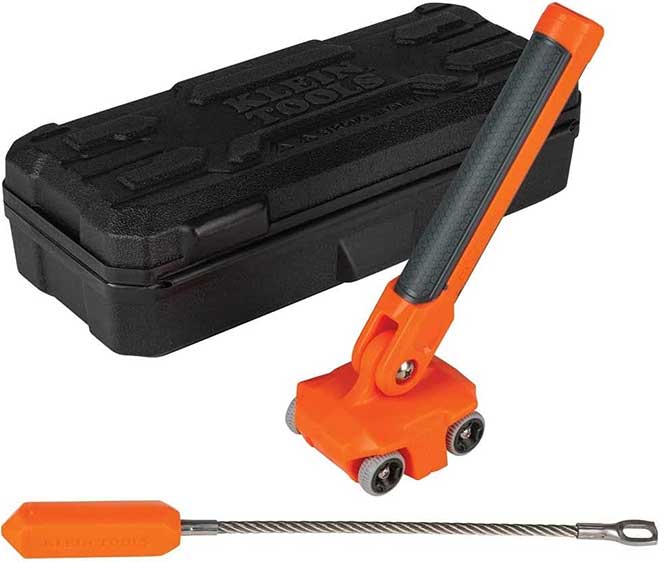
Key Takeaways:
- Strong Rare-Earth magnets enhance pulling efficiency.
- Mar-resistant wheels prevent wall damage.
- Dual functionality as a wire puller and stud finder.
- Comes with a durable, protective carrying case.
The Klein Tools 50611 Magnetic Wire Puller promises an easier way to route wires through walls and other tight spaces, a task that’s often tricky and time-consuming. So, we put it to the test in a typical home wiring scenario, threading cable behind a finished wall.
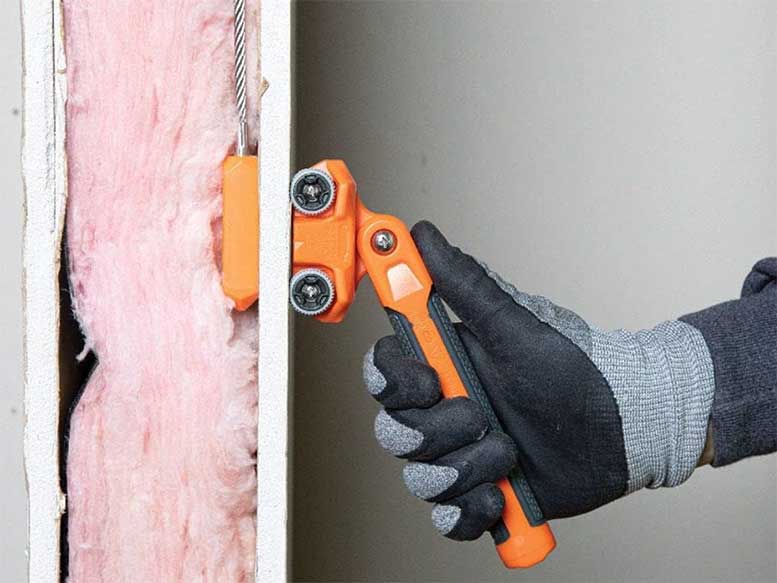
The first thing we noticed was the strong hold of its Rare-Earth magnets. We’ve used other magnetic wire pullers before, but the 50611’s magnets felt more powerful, making the wire pulling process smoother. It was especially helpful when we had to navigate through insulation, a task where weaker magnets often struggle.
Another standout feature is the tool’s design. The handheld unit is equipped with mar-resistant wheels, so as we guided the wire along the wall, there were no marks left behind. This is a big plus, especially when working in areas where the wall finish matters.
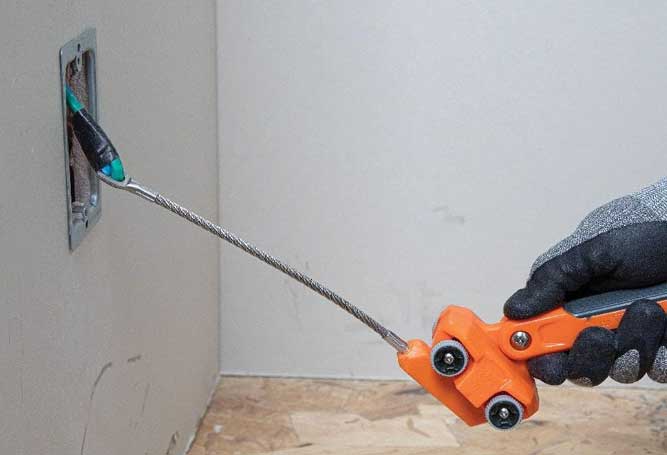
The 180-degree pivot handle with a comfortable grip made maneuvering the tool a breeze. We’ve had experiences with other wire pullers where control was a bit of a challenge, but with the Klein Tools 50611, it felt like we had better command over the tool’s movement.
The in-wall unit, made of flexible stainless-steel and strong Rare-Earth magnets, proved to be just as effective. The eyelet at the end of the leader was a useful feature, making it easy to attach wires for pulling.
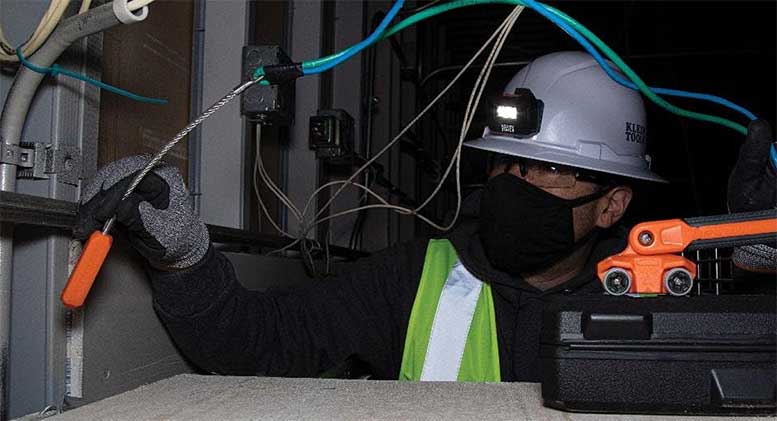
Storing the tool was another aspect we appreciated. It comes with a hard plastic carrying case that holds both units securely.
A bonus is its ability to double as a metal stud finder. We tested this on a wall with hidden metal studs, and the marking notches on the handheld unit made it easy to locate them. A pretty cool feature!
2. Magnepull XP1000-LC Magnetic Wire Puller
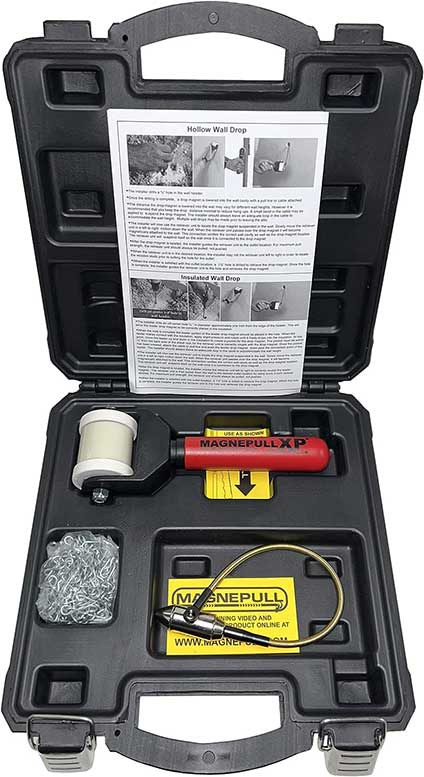
Key Takeaways:
- Patented clutch system for superior pulling strength.
- Only requires a 3/4 inch hole for installation.
- Compatible with multiple cable types.
- Higher cost, but offers professional-grade performance.
When we first got our hands on the Magnepull XP1000-LC Magnetic Wire Puller, we were curious to see how it would perform compared to the Klein Tools puller we first tested.
This tool has some impressive features, like a patented radial magnet design and a self-locking clutch, promising a strong and efficient cable installation experience.
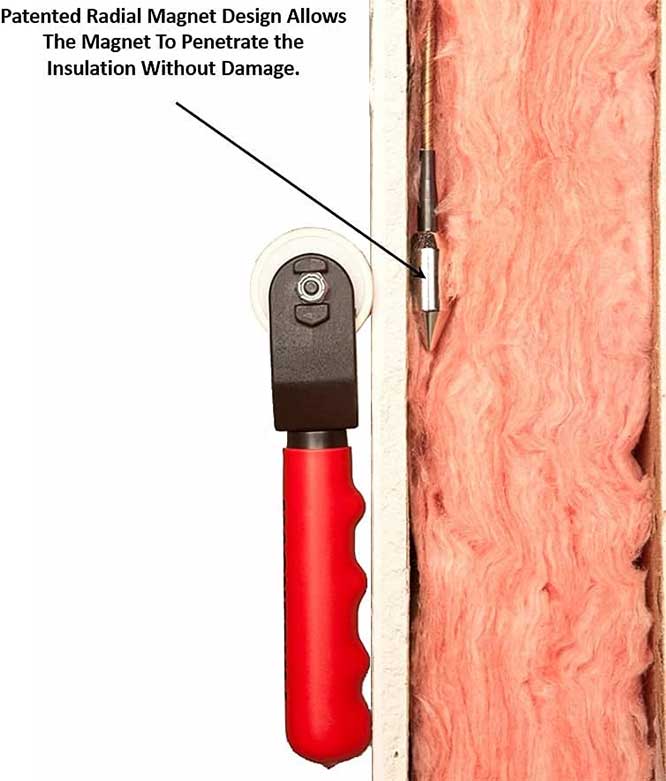
To put it through its paces, we set up a scenario where we needed to route Ethernet cables through a wall with multiple obstacles.
One of the first things we noticed was the Magnepull’s robust construction. It felt sturdy in our hands, a factor that’s important for a tool that sees frequent use. It’s a very solid-feeling piece of equipment.
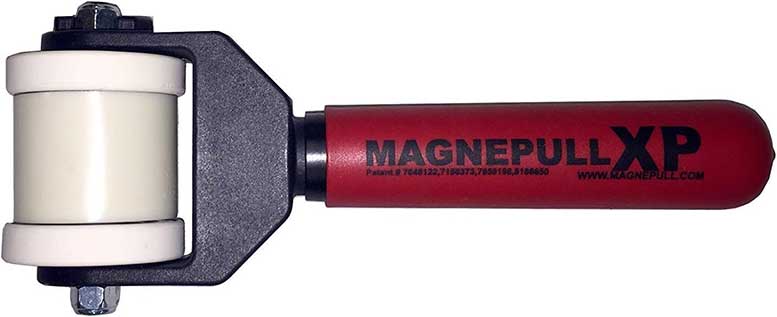
The patented locking clutch system is a real game-changer. This feature, combined with the tool’s 30% more pulling strength, meant we could pull cables with more confidence and less effort. Compared to the Klein Tools puller, the Magnepull seemed to have an edge in raw magnet power.
We also loved how it only required a 3/4 inch hole in the header for the cable to pass through. This is smaller than what many other tools require, making for a neater and less invasive installation.
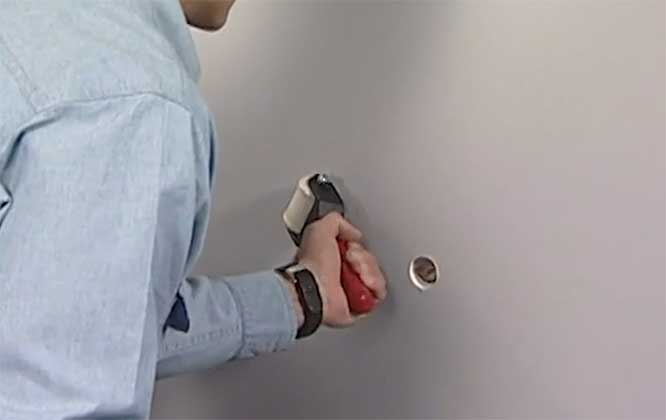
However, it’s worth noting that the Magnepull is about twice the price of the Klein Tools puller. This higher cost is a factor to consider, especially for those on a budget.
In terms of convenience, the Magnepull’s compact size made it easy to store and transport, and comes with a heavy duty, high quality carrying case, too.
While it’s a pricier option, its performance and strength might justify the cost for professionals who need a rugged, reliable tool for frequent use.
3. Chromex Magnetic Wire Pulling System
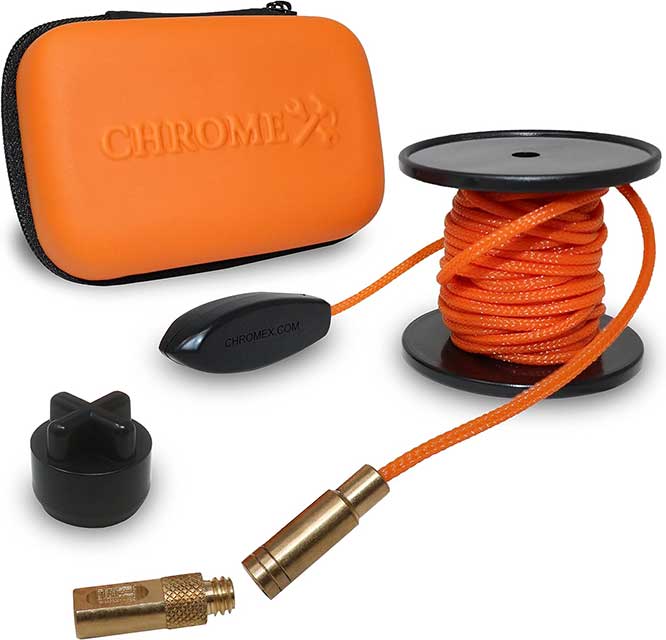
Key Takeaways:
- Unique 25-foot nylon string with spool design.
- Detachable brass eyelet leader enhances flexibility.
- Moderate magnet strength, suitable for most tasks.
- Exposed magnet bottom may scratch walls.
The Chromex Magnetic Wire Pulling System has a different design altogether. Instead of using a short metal lead, the magnet connects to your wire via a 25-foot long nylon string.
The string comes with a spool, which is designed to keep it from tangling. Because you’re using a string, you can easily pull your wire through conduits and other tight spaces. The spool also makes the string easy to store.
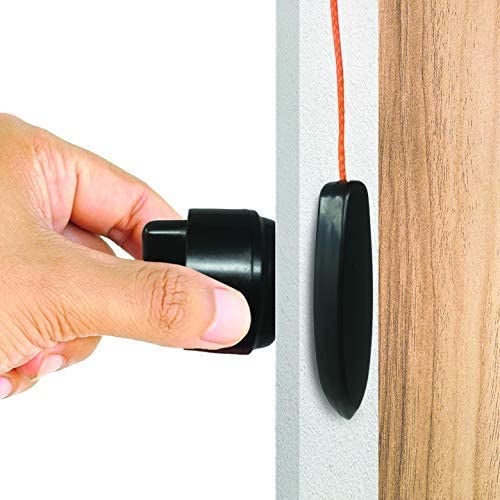
But we did notice a downside to the outer guide magnet’s design. Its plastic housing and cylindrical shape with a cross-shaped ridge were comfortable to hold, but the exposed metal bottom was a concern.
We had to be careful to avoid scratching the walls, something we didn’t worry about with the fully enclosed magnets of other systems.
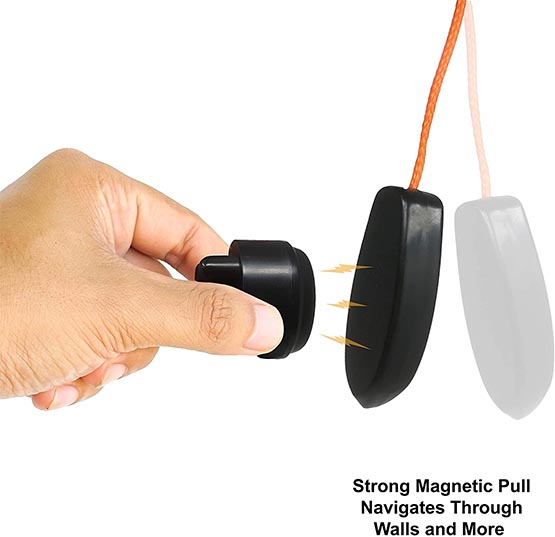
The inner magnet’s design, resembling a clothes iron, was practical. Its flat bottom side prevented damage to the drywall, a thoughtful feature that ensured a smoother pulling process without the risk of gouging the wall.
The detachable brass eyelet leader at the other end of the lead line offered great flexibility. We could attach different wires easily, and the option to shorten the lead line or use a different one altogether was a plus.
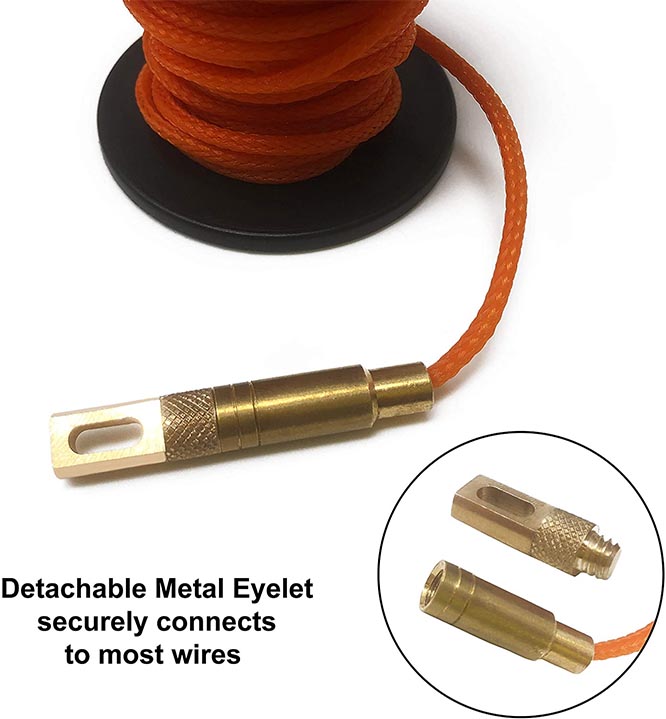
In terms of magnet strength, the Chromex system was moderate. It wasn’t as strong as the Magnepull, but it was sufficient for most tasks, including pulling through insulation. This made it suitable for both exterior and interior wall installations.
Our main critique of the Chromex system was the size of the lead magnet. To accommodate it, we had to drill a larger hole than the ¾-inch typically required by other systems. This could be a drawback in situations where space is limited or when navigating around obstacles like pipes.
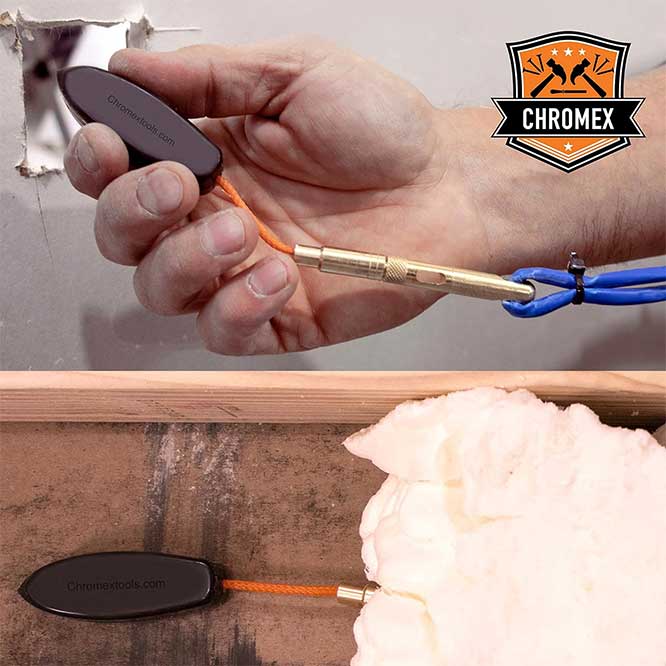
We also found the hard case with a secure zipper closure to be very convenient. It made transporting the wire puller easy, keeping everything organized and protected. It’s lightweight and portable.
Overall, the Chromex is a solid choice for those budget-friendly option looking for flexibility and ease of use in wire pulling tasks. Its unique design with the long nylon string and spool offers a different approach to wire routing, suitable for a variety of situations, though it may have limitations in more confined spaces.
FAQs about Magnetic Wire Pullers
What is a magnetic wire puller?
- A magnetic wire puller is a tool used to route wires through walls, ceilings, or confined spaces. It uses a magnet to guide and pull wires, making the installation process easier and less time-consuming, especially in tight or hard-to-reach areas.
How does a magnetic wire puller work?
- They typically consists of two parts: an in-wall unit with a magnet attached to a wire or cable, and an external guide magnet. The user feeds the in-wall unit through the starting point and then uses the external magnet to navigate and pull the wire through the desired path.
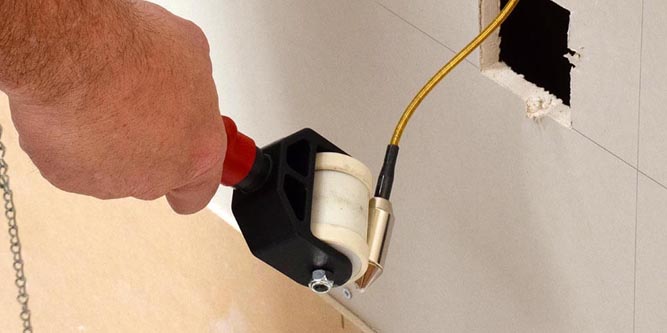
Can magnetic wire pullers be used on all types of walls?
- They work best on drywall or thin materials where the magnet can easily attract through the surface. They may not be effective on very thick walls or walls with dense materials that interfere with magnetic forces.
Are magnetic wire pullers safe to use near electrical wiring?
- Yes, magnetic wire pullers are generally safe near electrical wiring. However, it’s important to always turn off electricity in the area where you’re working to avoid any risk of electrical shock or damage.
Can magnetic wire pullers damage walls or cables?
- Generally, magnetic wire pullers are designed to minimize wall damage, especially those with mar-resistant wheels or guides. However, care should be taken during use to avoid scraping or gouging walls. They are unlikely to damage cables if used correctly.
Meet Ry, “TechGuru,” a 36-year-old technology enthusiast with a deep passion for tech innovations. With extensive experience, he specializes in gaming hardware and software, and has expertise in gadgets, custom PCs, and audio.
Besides writing about tech and reviewing new products, he enjoys traveling, hiking, and photography. Committed to keeping up with the latest industry trends, he aims to guide readers in making informed tech decisions.

